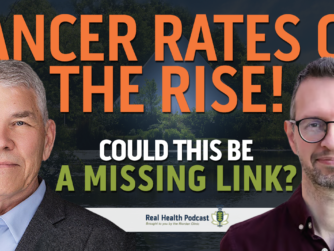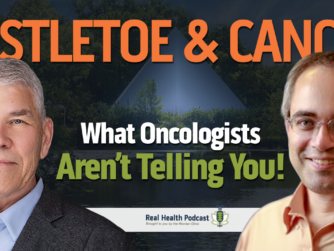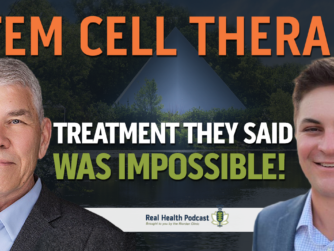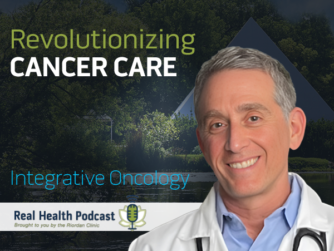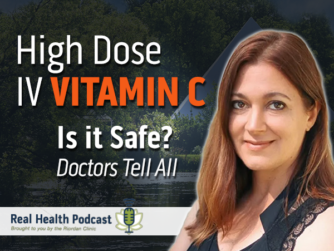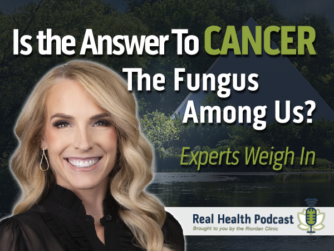In this episode of the Real Health Podcast, Chief Medical Officer Dr. Ron Hunninghake, MD, welcomes back Jenn Nolan, the owner of Remission Nutrition as they discus the critical topic of cancer survivorship. Jenn shares insights on the importance of nutrition for those in remission, practical advice for rebuilding health post-therapy, and how to prevent recurrence.
Thanks to This Episode’s Sponsor
Riordan Clinic Nutrient Store: https://store.riordanclinic.org/
Links
Learn more about the hosts: Jen Nolan: https://www.remissionnutrition.com/jennolan
Dr. Ron Hunninghake: https://riordanclinic.org/staff/ron-hunninghake-md/
Learn more about Riordan Clinic: https://riordanclinic.org/ Interested in becoming a Patient: https://riordanclinic.org/request-an-appointment/
Read the Transcript
Disclaimer: The information contained on the Real Health Podcast and the resources mentioned are for educational purposes only. They’re not intended as and shall not be understood or construed as medical or health advice. The information contained on this podcast is not a substitute for medical or health advice from a professional who is aware of the facts and circumstances of your individual situation. Information provided by hosts and guests on the Real Health Podcast or the use of any products or services mentioned does not create a practitioner-patient relationship between you and any persons affiliated with this podcast.
00:00:00:00 – 00:00:17:06
Narrator
This is the Real Health podcast brought to you by Riordan Clinic. Our mission is to bring you the latest information and top experts in functional and integrative medicine to help you make informed decisions on your path to real health.
00:00:17:08 – 00:00:34:16
Dr. Ron Hunninghake
Welcome everyone to the Real Health Podcast. I’m Dr. Ron Hunninghake , and it’s my pleasure today to have Jen Nolan back with us. Jen is the owner of Remission Nutrition and she’s been on our program. And Jen, welcome back to us again.
00:00:34:18 – 00:00:36:21
Jen Nolan
Thank you. I’m so excited to be here again.
00:00:37:00 – 00:00:52:23
Dr. Ron Hunninghake
Yeah. So most people they may not know what remission nutrition is though. Or remission. That sounds like cancer. People who are in remission need nutrition. Is that is that about it?
00:00:53:00 – 00:01:17:04
Jen Nolan
I like that. Yeah. And I believe that anyone can use some probably some nutrition advice. So we work with folks that are in remission, not in remission, who are looking for prevention. We work with a lot of and remission can be remission from a lot of different disease states, too. Sure. Yeah.
00:01:17:06 – 00:01:45:01
Dr. Ron Hunninghake
Yeah. And we’re talking about cancer survivorship today, which goes right in line with this. And and it’s the idea that, people after they have gone through, you know, the shock of being diagnosed with cancer and then the, the oftentimes the very tough therapies that are involved after they finish that, it’s kind of like people feel like they kind of like drop off the cliff, you know, okay, now what do I do?
00:01:45:02 – 00:02:07:06
Dr. Ron Hunninghake
How do I prevent this from recurring? How do I regain my health? And and so what what are you telling or not telling? What kind of a relationship are you forming with patients who are in this situation? And how are you helping them regain their health and stay in better health?
00:02:07:08 – 00:02:29:15
Jen Nolan
Yeah. So through nutrition, I feel like there’s so much we can do, right, to sort of, in a sense, clean house or help them clean house. And that can be, you know, oftentimes appetite goes away. People lose quite a bit of weight. They might be very, put off by certain foods, that they were maybe able to eat before.
00:02:29:15 – 00:02:50:04
Jen Nolan
And all of a sudden they’re like, I never want to look at that thing again. So it’s oftentimes just talking through it with them and getting them into I mean, we’re very much into a very whole foods based diet as best we can. How can we help people with building back up from fatigue? You know, a lot of people have been very fatigued.
00:02:50:05 – 00:03:10:07
Jen Nolan
Not a lot of energy. So there’s all kinds of things we can do with that. And then, of course, I mean, we can go a whole other direction and talk about the mental emotional aspect of this as well and how to deal with any potential, I mean, fears of things, you know, kind of coming back and revisiting.
00:03:10:07 – 00:03:30:13
Jen Nolan
So we want to clean house after the therapies and we want to encourage that. They don’t just, feel like they’ve rung the bell, so to speak, once they’re done with treatment and then they’re good to go. So it’s encouraging a really healthy sort of lifestyle rather than just that was your nutrition plan for then while you were in treatment.
00:03:30:15 – 00:03:54:04
Dr. Ron Hunninghake
So yeah, I can kind of see it going two ways. One where people are so thankful to be through their therapy and they really are motivated to find out, okay, I don’t want this to happen again. I want to be in the very best nutritional state that I can be in. But then the other side of that might be that they may be very tired, very wiped out, depleted in many ways.
00:03:54:04 – 00:04:16:00
Dr. Ron Hunninghake
And I what I often see in my practice with patients is if they’re stressed and tired, they don’t have the energy to go find good food, or they go out and they buy the convenience foods or, you know, fast foods, and those are loaded with all the wrong things. So, so, so there’s two different roads that people can go down.
00:04:16:02 – 00:04:28:16
Dr. Ron Hunninghake
And so maybe we could kind of explore each road. And so you were talking about a whole foods diet. What what’s the very best thing that people can, can do for themselves in terms of good nutrition.
00:04:28:18 – 00:04:54:09
Jen Nolan
Yeah. I mean, I think I’m very I mean, you we speak the same language in terms of metabolic health and metabolic nutrition. So still sticking with if if they’ve been doing it already, still sticking with a lower carbohydrate diet. So they’re not, you know, eating a lot of those processed junk foods, you know, that are filled with sugar, filled with seed oils, filled with a lot of, you know, processed grains and things.
00:04:54:14 – 00:05:22:15
Jen Nolan
So if we can encourage, you know, a a lot of vegetables as possible in some people, if they’re kind of building their digestive system back up after treatment, which can be needed. Right? We might encourage more cooked vegetables than a lot of raw veggies. So it would be in my opinion, it’s very plant forward plant rich from a lot of, again, colorful vegetables, some of the lower glycemic fruits.
00:05:22:17 – 00:05:46:03
Jen Nolan
And then as much as these really healthy fats as possible and I believe strongly in the protein aspect as well. So we’ve got to be incorporating enough protein so that their tissues can heal. So I think that’s a really big part of it. Gut health. We need those amino acids. We need the good tissue building ingredients right. Or nutrients.
00:05:46:05 – 00:06:07:04
Jen Nolan
So that would be my road for somebody who is ready to sort of build back up after treatment. And it’s finding things. It’s working with people very individually and figuring out where they are. Are they so wiped out that they just want to go and eat comfort food and buy things in a package? How can we help them find better things?
00:06:07:06 – 00:06:15:19
Jen Nolan
How can we enlist maybe family members or support to kind of help with that? So we’ll work with people in all different areas.
00:06:15:21 – 00:06:49:13
Dr. Ron Hunninghake
Yeah, I think the the whole thing about packaged foods is I’ve just been listening to a book on the, the devastating effects of these, plant oils, the, the, seed oils. And people don’t realize that that might even be worse than sugar. I mean, I, I’ve always said sugar was the big thing, but I’m beginning to think that these, these vegetable oils that oxidize easily and get into the body, it’s they’re all the convenience packaged foods are loaded with these because they’re cheap.
00:06:49:13 – 00:07:13:00
Dr. Ron Hunninghake
And people don’t realize that they have a very strong pro-inflammatory effect on the body. And the, you know, occlude the detoxification systems and all the things that are post cancer patients are going to need. So, can you speak to that a little bit more about how do you help people see the light on that?
00:07:13:02 – 00:07:42:12
Jen Nolan
Yeah, I mean, listening to books like you’re listening to that can sometimes be helpful. I really like to just educate people on how to read the labels, which oils to look for and which to which are. Okay. Right. So doing a lot of that sort of education so people can really shop the right way. I mean, I have I’m sure you’ve had the experience where I’ve bought something at the store and I get home and I’m like, oops, I didn’t even look.
00:07:42:12 – 00:08:06:00
Jen Nolan
I didn’t even realize that had a seed oil in it, you know? And just because something says it’s organic or even is at the health food store, we have to still read labels. And so it’s really that awareness piece. There’s a company actually, it’s an app that people can put on their phone. It’s called Seed Oil Scout. And I’m not sure if you’ve heard of that, but no, it’s really neat.
00:08:06:00 – 00:08:25:21
Jen Nolan
So it’s seed oil Scout and you’re able to search for restaurants that don’t use seed oils, which is really nice. So that’s another, you know, just way to raise awareness. And yeah, to be educated on how to, how to shop or eat out.
00:08:25:23 – 00:08:49:11
Dr. Ron Hunninghake
Yeah. And, and people don’t have to buy everything organic. They don’t have to buy. But if they can get fresh foods, if they can get foods that, I would just call them farm foods. And then the old sense of farming, it’s ironic these days that farmers, unfortunately, are, having to do all their shopping at the grocery store when they used to grow their own foods.
00:08:49:11 – 00:09:12:17
Dr. Ron Hunninghake
And I realize that people that are coming off of cancer may not have great energy reserves, but, if they can start thinking about, eating the way we used to eat, and getting colors, freshness, and watch out when instead of packaged in a label because then they, more often than not, it’s already been altered.
00:09:12:19 – 00:09:34:01
Jen Nolan
You bet. And I think that it’s important to for folks when they’re out shopping and they’re looking at a label, the more ingredients that are listed on a label is a good indicator that it might not be something you want to purchase, right? And so if it has a few ingredients that’s better than one that has 9 or 10 ingredients listed.
00:09:34:03 – 00:09:52:12
Jen Nolan
And then at the beginning you want to see what shows up first in the label. And the thing at the top of the list has the most of that ingredient in it. So, you know, if sugar or, seed oil is the second ingredient, it’s got a lot of that in it. So that’s another way to sort of prioritize.
00:09:52:14 – 00:10:19:15
Jen Nolan
You’re right. We don’t have to always you know, not everybody’s going to buy organic everything. Right. But if you can eat real fresh food, like you said, things that are in a package, you know, a lot of people talked about and I don’t know, I haven’t said this in a while, but when you’re shopping at the store, shop the perimeter of the store, and then you’re getting the more whole foods, and that can be a really helpful just thing to keep in mind.
00:10:19:17 – 00:10:43:05
Dr. Ron Hunninghake
And colorful foods, I mean, real colors. The that’s where all the phytonutrients are and your antioxidants and, fiber and all the things that your body needs to rebuild because many people who are coming off of cancer are in a catabolic state. Their things are being broken down because of the intensity of either radiation therapy or chemotherapy.
00:10:43:05 – 00:10:57:14
Dr. Ron Hunninghake
And so they really do need to build back up again. And, these are all clues to help them kind of make better choices and, get support from their family for the right things.
00:10:57:18 – 00:11:33:10
Jen Nolan
So yeah, definitely. And then the other road we were talking about, can you refresh my memory if we’re going through, we’ve gone through treatment and somebody is. Well, I guess we kind of combined the two roads, right? Whether you’re wanting to clean house or maybe you’re just tired and worn out and you don’t really have the energy to do it, then we figure out a way to sort of, keep on keeping on, but not just like, woo hoo, I’m done with treatment and I get to do whatever I want.
00:11:33:12 – 00:12:08:16
Dr. Ron Hunninghake
Yeah, I hope people are looking at the fact that the cancer didn’t just happen, that there may have been lifestyle choices or factors that led up to it, and hopefully in the process of revising their, their lifestyle that they they can look back on where they came from and where they want to go and see this as an opportunity to go to a whole better level of living, better quality of life, which means a better quality of food.
00:12:08:18 – 00:12:10:23
Dr. Ron Hunninghake
Those types of choices.
00:12:11:00 – 00:12:40:06
Jen Nolan
Yeah, absolutely. And we’re really I love to watch that process and watch people often times just feel better and better and better and physically and emotionally, as they’re changing their lifestyle habits. And certainly nutrition. Nutrition is something that we can do when things feel really oftentimes out of control, you know, whether we’re at any time during a cancer journey.
00:12:40:06 – 00:12:53:02
Jen Nolan
Right? So it’s something that we can do in a really beautiful way. And I love the word nourishment. I’m using that a lot in balance. Those two words are really, are big ones for me.
00:12:53:04 – 00:13:24:17
Dr. Ron Hunninghake
Yeah. You know, just the whole concept of nourishing, you know, I, I talk to our cancer patients in terms of nourishing relationships, nourishing sleep. Sleep is a kind of a nourishment, getting the right kinds of exercise. And, and the the whole person element of this, this comes back to survivorship. The word that we started out with survivorship is kind of like a it’s almost like a state of mind that people need to get into that.
00:13:24:19 – 00:13:51:00
Dr. Ron Hunninghake
Hey I’ve made it this far. Now where do I need to go. Because I don’t want to go back to this again. So it’s taking ownership of this, this opportunity to, shall we say, start over, not to really start over, but to evolve further along than where they were in the process of healing and growing and feeling confident that they can maintain their, their health.
00:13:51:00 – 00:13:52:21
Dr. Ron Hunninghake
From this point on.
00:13:52:23 – 00:14:18:19
Jen Nolan
Absolutely. And if you were to add another word, it would be empowerment. These if we feel empowered, we’re going to continue to evolve, like you said. And so being empowered and that’s our job, right, is to empower people to see that they can make a difference in their journey. People often times are very and understandably so fearful.
00:14:18:21 – 00:14:29:09
Jen Nolan
And so they’re moving from a place of fear. And it’s really hard to feel empowered when you’re feeling a lot of fear. So that’s a big part of it too.
00:14:29:11 – 00:14:59:20
Dr. Ron Hunninghake
Well, and and then the role that you play as a kind of nutrition coach, you know, we all need support. We need guidance. We need the right kind of, direction directionality. And so how do you find that role, how how does that work for you in terms of what kind of a relationship are you in with cancer patients who have survived?
00:14:59:22 – 00:15:06:11
Dr. Ron Hunninghake
But they they’re in a fearful state. But on the other hand, they’re they’re ready to make changes. They’re.
00:15:06:13 – 00:15:26:15
Jen Nolan
Yeah. I mean, we both know that term meeting people where they are. And so every single person that I work with is different. They’re in a different place. They might be in a different time in their journey. They might again be just interested in prevention. Or they’ve gone through the, the treatment and they’re looking to prevent it from coming back anywhere.
00:15:26:15 – 00:15:54:07
Jen Nolan
I’m meeting people where they are. And really I and I believe our whole team, we really feel strongly about leaning in and being there with them. We don’t just do. Nutrition is a huge part of what we do, but we also, I mean, there’s such a mental, emotional aspect that we work through. There’s a lot of love that we share and a lot of connection, and we oftentimes get to spend more time with these folks than a lot of the other people on their care team.
00:15:54:07 – 00:16:19:05
Jen Nolan
Do you know, because we’re having these long, beautiful conversations, sometimes very difficult conversations where they’re oftentimes with other family members and support members, we work all on zoom, but it’s it can be very like an intimate sort of relationship that we end up being able to have with people. And it’s pretty beautiful. So, really being there for them, whether we’re cheering them on, we’re holding them accountable.
00:16:19:05 – 00:16:37:06
Jen Nolan
We’re giving them words of encouragement, education, the same things you all do. And we we work with the terrain, too. So we look at sleep, we look at stress, we look at, movement and exercise and all of it. So it’s really it’s really special.
00:16:37:08 – 00:17:09:21
Dr. Ron Hunninghake
One of Doctor Riordan’s I think, greatest contributions to what this process of healing is all about is, he said, the very first thing we understand ourselves as, as the, as the practitioner working with the patient is that we are co learners because each individual is unique and different, each situation is different. What they’ve gone through is different. The family support that they have or don’t have that can be unique to that person.
00:17:09:21 – 00:17:31:13
Dr. Ron Hunninghake
So when you go into that co learning mode as a practitioner, we’re opening ourselves up to them in a way that they feel the support they feel there with them. We are cooperating with them and that is empowering. And many times that’s that’s the secret in the sauce right there.
00:17:31:15 – 00:17:36:10
Jen Nolan
I can claim beautifully said I love that co learning to.
00:17:36:12 – 00:18:03:19
Dr. Ron Hunninghake
Yeah. Well I think that’s what you do I think that’s what we’re all working on is doesn’t matter how much we know or think we know, every situation’s a new situation. And so we come into it with that beginner’s mind in the sense that we have to develop the relationship with who we’re working with in a way that they feel supported and, empowered and ready to begin again.
00:18:03:20 – 00:18:12:02
Dr. Ron Hunninghake
Every day we begin again, especially with diet. You know, it’s tricky these days to find the right kinds of foods. You know, it’s just always a challenge every day.
00:18:12:02 – 00:18:34:10
Jen Nolan
So it is, it is. And I and I, you know, obviously have that conversation with people every day. I just said it yesterday to begin again with a client who had a really rough day the day before, she was in tears and it’s like, you know, it’s okay. We get to begin again. And you know, you can’t beat up on yourself.
00:18:34:12 – 00:18:46:02
Jen Nolan
You can’t stress and think you’ve done something wrong or, you know, I don’t like to give foods, you know, the label bad. And that guilt piece and that stress.
00:18:46:06 – 00:18:47:01
Dr. Ron Hunninghake
Doesn’t work.
00:18:47:03 – 00:18:49:10
Jen Nolan
For mental in anything. Yeah.
00:18:49:12 – 00:19:21:19
Dr. Ron Hunninghake
Yeah. So you with nutrition remission, you’re there. You’re the purpose of your your organization is to help people establish a solid remission and to have the mission of going forward, to stay well and not have to deal with their cancer well. But in a sense, you’re always dealing with the memory of it. But, to, to put the fear behind and use it as a motivation to grow and to get stronger.
00:19:21:21 – 00:19:26:13
Dr. Ron Hunninghake
And that, I think, is what survivorship is all about.
00:19:26:15 – 00:19:51:01
Jen Nolan
Yeah. And I think that again it’s so it’s a tricky one right. The word remission because I think sometimes that can end up as being this big expectation. And on you know I’m going to come to wherever it is whatever clinic or and I’m going to be quote unquote cured, you know, and I don’t think that that’s quite fair.
00:19:51:04 – 00:20:19:20
Jen Nolan
I think it’s more we are here to help support you and support your terrain, to make your terrain, your body, an inhospitable place for cancer to grow and thrive. And remission can mean it’s kind of the pulling back of for the, the, the, yeah, pulling back on that, whatever that thing is. Right. And so it’s really important to have expectations and understand what we’re there for.
00:20:19:20 – 00:20:39:19
Jen Nolan
But again, this whole learning piece to help educate people, support them and help really promote, yes, remission, prevention and all of those things, through our work together. And it is it’s co-work to, you know, we’re all working.
00:20:39:21 – 00:21:11:05
Dr. Ron Hunninghake
Yeah, yeah. And it’s it’s looking forward to a life of better health. Not so much running away from a bad, terrible experience in the sense that it’s a it’s a very scary experience. And for people to achieve remission is huge. And so now how can we stabilize it, establish it, solidify it, make it stronger, help us grow, help us become what we really want to become as a result of this, this tough experience.
00:21:11:05 – 00:21:36:13
Dr. Ron Hunninghake
Because really, most of us, that’s how we gain our our most important lessons is we we go through tough experiences and we learn. So, Jen, I just remember that you are coming to Wichita this summer, early August to talk about remission nutrition. And we’re going to have Doctor Dunn and Doctor West here as well. And we’ll be doing a panel.
00:21:36:15 – 00:22:02:02
Dr. Ron Hunninghake
Wow. That’s going to be a dynamic opportunity for people to come and interact with you. And and our, our, oncologists as a way of kind of getting ideas for what they can do to strengthen their survivorship if they if they have had cancer or prevention. So those, those types of things. So this is great to have you been to Kansas before.
00:22:02:04 – 00:22:11:16
Jen Nolan
I have not I’m very excited and I’m very excited to meet everyone in person because we spend so much time on these computers that it’ll be really fun to be in person.
00:22:11:18 – 00:22:22:08
Dr. Ron Hunninghake
Oh yeah, we are real bodies, aren’t we? Okay, well, we’ll look forward to seeing you this August for remission. Nutrition in Kansas.
00:22:22:10 – 00:22:23:06
Jen Nolan
Awesome thanks.
00:22:23:09 – 00:22:40:03
Dr. Ron Hunninghake
Thanks, Jen. I’m very I’m very happy for what you do. And thank you for being on our program. And I hope that you will continue to serve as an inspiration to people on this journey to, survivorship from the cancer. So thanks again.
00:22:40:05 – 00:22:41:11
Jen Nolan
Thank you so much.
00:22:41:11 – 00:23:11:03
Narrator
Thank you for listening to The Real Health podcast. If you enjoyed this episode, be sure to subscribe and leave us a review. You can also find all of the episodes in show notes over at Real Health podcast.org. Also, be sure to visit Riordan Clinic.org, where you will find hundreds of videos and articles to help you create your own version of real health.


